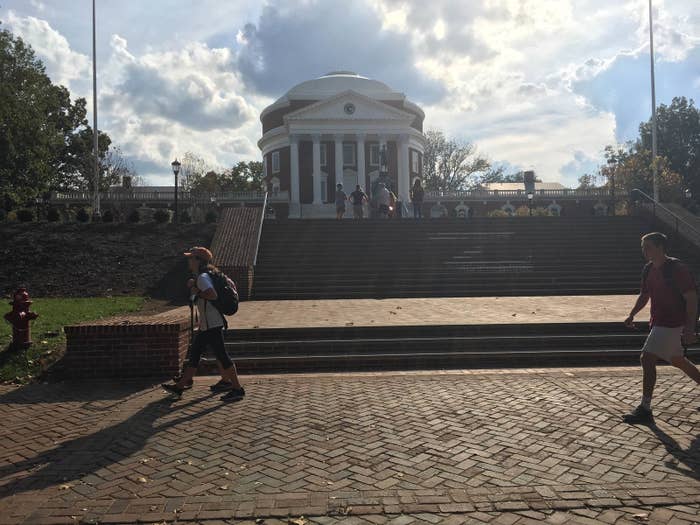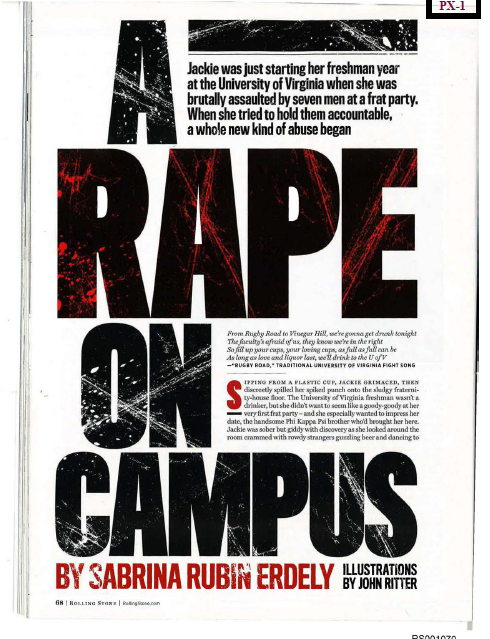
Liz Seccuro thought Rolling Stone’s article about sexual assault at her alma mater, the University of Virginia, would be “groundbreaking.” The story detailed an alleged gang rape of a woman at the Phi Kappa Psi fraternity, the same house where Seccuro was assaulted in 1984. But within two weeks of publication, discrepancies were brought to light challenging whether the gang rape actually happened and exposing flaws in the magazine’s reporting, leading Rolling Stone to retract the story.
“People were already vocally doubting rape victims and saying they’re all liars; the Rolling Stone screw-up just gave them a larger platform and a louder voice,” Seccuro told BuzzFeed News.
Like many survivors and advocates, Seccuro worried the magazine’s journalistic failures would set their cause back decades. Students, administrators, and reporters nationwide may be more hesitant to believe women who say they were sexually assaulted, they feared, and survivors might recoil from sharing their experience with others.
But that hasn’t happened, said Kristen Houser, a vice president with the Pennsylvania Coalition Against Rape, one of the nation’s oldest victim advocacy groups. As evidence, she points to media coverage of women alleging Donald Trump sexually assaulted them and the steps journalists have taken to verify those allegations.
“How fantastic that’s being discussed on national television,” Houser said. “We are reporting it and we are fact-checking these stories — I just have not seen the chilling effect we were all holding our breath about.”
Oddly enough, the Rolling Stone article, despite its flaws, actually served as a wake up call, said Hannah Shadowen, a fourth-year UVA student and president of the university’s peer education group One Less.
"I just have not seen the chilling effect we were all holding our breath about."
“I think the administration took more notice. I think our leverage on campus has grown,” said Shadowen. “We got people to pay attention and believe it is an issue. I think it resonated enough with people on [campus] to say even if this one story isn’t accurate, it’s real, it’s real enough to me, it is real enough that it matters. It wasn’t a great way to get there, but maybe it was necessary to shake people up.”
The libel trial emanating from the Rolling Stone story began last week, at a time when sexual assault has become a focal point of the presidential election. Former UVA dean Nicole Eramo is suing the magazine and reporter Sabrina Rubin Erdely, alleging they portrayed her as indifferent to the alleged rape victim portrayed in the story.
Sexual assault survivors and advocates told BuzzFeed News that, despite some fallout from the UVA story, the movement was buoyed by several events in 2015.
Weeks after the story was retracted, the campus rape documentary The Hunting Ground debuted at the Sundance Film Festival. Some critics charged that the film had credibility issues, but The Hunting Ground and another similar documentary, It Happened Here, were screened at hundreds of college campuses. Meanwhile, the White House’s “It’s On Us” anti-rape campaign was touring campuses and raising awareness with help from celebrity spokespeople including Lady Gaga, Kerry Washington, and Jon Hamm.
The growing number of schools under federal investigation for mishandling sexual assault cases also helped show that the issue was bigger than what happened at UVA, noted Sofie Karasek, a co-founder of the activist group End Rape On Campus. One of the largest surveys of college students about sexual violence in 2015 found close to one-in-four undergraduate women had experienced some form of assault.
So many things were in motion that Rolling Stone’s failure couldn’t stop the increasing awareness about the reality of sexual assault in America, Karasek said.

According to Karasek, one of the movement's biggest rebounds in 2015 happened away from campuses, when women accused Bill Cosby of rape, ultimately leading to criminal charges being filed against him in Pennsylvania.
“I think Rolling Stone knocked us down for about six months, but we rebuilt,” Seccuro said. “Sexual assault is now at the forefront of election. Never before have I heard a president and vice president talk about it. People are by and large deploring and horrified by Trump’s attitude, his words, his actions.”
By summer 2016, for the first time, both the Democratic and Republican national party platforms included references to addressing sexual assault on campuses and elsewhere. And when the tape of Trump saying he could kiss women without their consent and “grab them by the pussy” was released, politicians from both parties acknowledged he was describing sexual assault, something he was pressed on in a presidential debate.
“Our culture is talking about this now on a regular, daily basis,” said Houser, of the Pennsylvania Coalition Against Rape. “That is a change. That is not how life was five or six years ago.”
To be sure, the Rolling Stone debacle did create hurdles. The Sexual Assault Resource Agency, a Charlottesville non-profit center, had a decrease in the number of students coming to the emergency department to get help after a sexual assault since the article’s retraction, according to its director, Rebecca Weybright. She worries that this is in part because the article’s retraction fed into a belief that women lie about rape.
And like many schools, UVA still has a problem with sexual assaults being underreported.
The number of incidents reported on campus fluctuated over the years: from 13 in 2011, 11 in 2012, up to 26 in 2013, a high of 39 in 2014, and down to 15 in 2015. A university spokesperson noted that the spike in 2014 could possibly be attributed to increased attention from events on campus, and that 2015 was more on par with previous years. Students like Shadowen acknowledge that these numbers don’t reflect the reality on campus, and say a 2015 survey that found 23.8 percent of female students were assaulted while undergraduates at UVA is a better measure of sexual violence at the school.
"Rolling Stone knocked us down for about six months, but we rebuilt."
The immediate aftermath of the article also made it harder for One Less to focus on educating students — distracted by the story’s sensational details — about the sobering realities of sexual violence.
Many students were fed up with reporters who had swarmed the school repeatedly in the 2014-15 academic year: first, after the disappearance of UVA student Hannah Graham in the fall of 2015, and then by the article’s publication two months later. Tensions heightened that spring when a black UVA student, Martese Johnson, was slammed to the ground by state liquor agents who wrongly thought he had a fake ID, another controversial incident that brought the media back to campus.
“My college experience will always be marked by that,” Shadowen said. “It was really difficult and hard and painful, but the changes I saw afterward I think outweighed the hardness of it.”
UVA added more discussion on safety at summer orientation. It also allowed One Less and its all-male counterpart One in Four to conduct educational sessions for all first year students living on campus in the fall, as part of a program called “Dorm Norms” that teaches students bystander intervention and how to support survivors. It was recently completed for its second year.
Requests for presentations on campus by One in Four have “skyrocketed in the past couple of years,” said Nick Favaloro, the group’s public relations chair and former president.
“We’ve seen post-Rolling Stone that there’s been an increase in the [UVA] administration’s willingness to talk about the issue of sexual assault, and not just talk around it,” Favaloro said. Whether this will permanently change campus life probably won’t be clear for a decade, he said.
Three days before the Eramo v. Rolling Stone trial began in Charlottesville, a new, university-funded program called the Power, Violence and Inequality Collective hosted events at UVA highlighting decades of research about sexual violence in society. Denise Walsh and Nick Winter, both UVA professors focusing on gender and politics, started the collective, which also supports graduate student research on structural violence, such as sexual assault, harassment, and racial profiling.
“For many of us, the retraction doesn’t change a lot of people’s really strong commitments to addressing this issue,” Walsh said. “Regardless of whether this story was fabricated or not, we had problems; every college has problems with sexual assault.”
The idea originated a few years ago, Walsh told BuzzFeed News, but it didn’t seem feasible until after Rolling Stone. Her research shows that negative events can often create opportunities for change — whether that’s the Rolling Stone article or Trump’s lewd comments about women.
“Culturally,” Walsh said, “we are at a moment where women are realizing collectively, as well as individually, we can speak out about this.”
